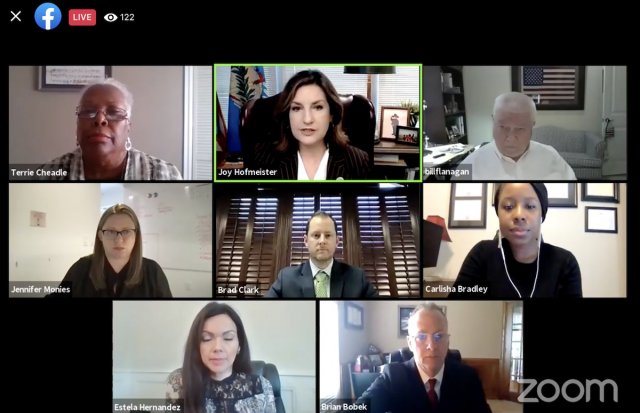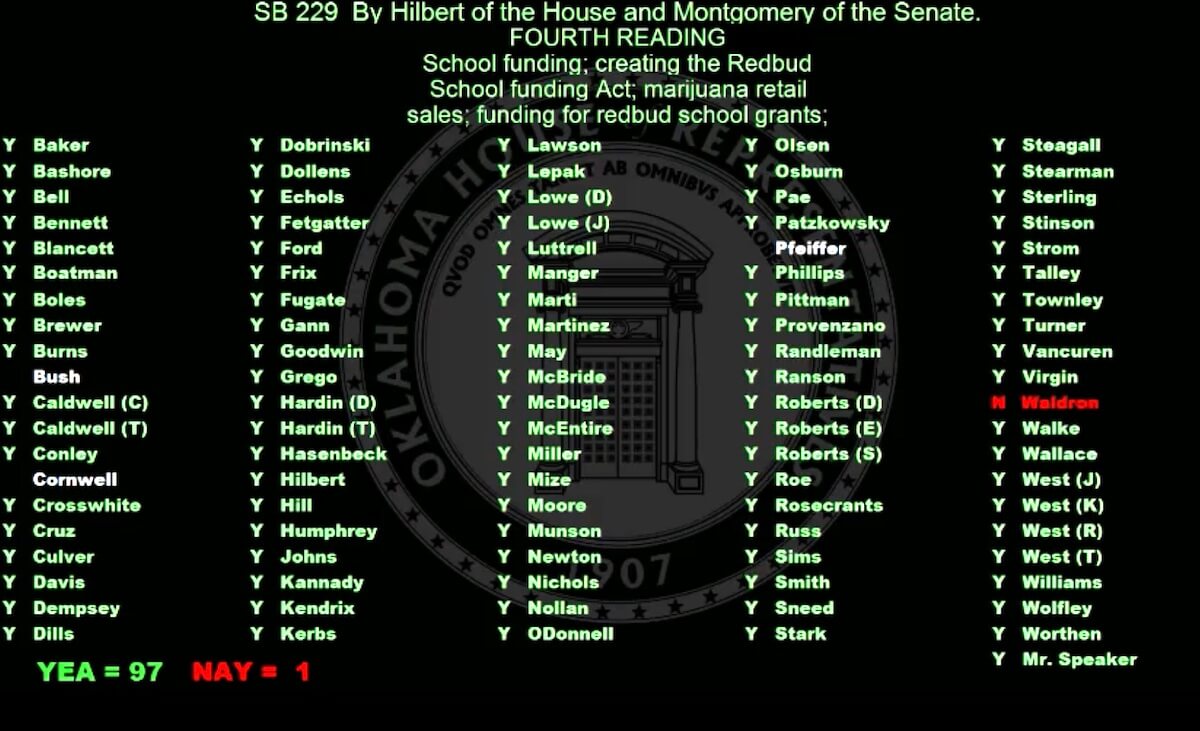

During a special meeting tonight, the State Board of Education unanimously approved a motion to rescind its March 25 resolution equalizing funding between public charter schools and traditional public schools. The action came hours after the Oklahoma Legislature passed a bill viewed as a compromise on the issue because it will provide additional dollars for brick-and-mortar charter schools, as well as school districts with lower local revenues.
State board member Trent Smith read the motion to rescind the March resolution, which pertained to a 2017 lawsuit from the Oklahoma Public Charter Schools Association. That lawsuit argued that the state board was not funding public charter schools in the state equitably. The controversial March resolution was challenged in court by more than 180 school districts, but it ultimately forced the Legislature to resolve the dispute with state statute.
“This rescission is subject to a few items, first, a dismissal being filed in the 2017 lawsuit by the (Oklahoma Public) Charter Schools Association, a release of all claims against the State Board of Education, a release of all claims against the State Department of Education, and Gov. (Kevin) Stitt signing Senate Bill 229 into law,” Smith read.
SB 229, or the Redbud School Funding Act, was approved by the state House Monday afternoon and will provide marijuana-related tax revenue for brick-and-mortar charter schools and traditional public school districts that currently receive less local aide. The bill was introduced to address the local funding equalization question raised by the OPCSA and brought to the forefront of education policy discussions by the board’s March resolution, which had been requested by Smith..
Smith said Monday that he and other members of the board had been involved in the process of crafting the bill.
“I’m very excited about (SB) 229,” Smith said. “I think once that bill passes, that would satisfy the intent of the board to equitably fund charter schools and render any future board action moot.”
State Superintendent of Public Instruction Joy Hofmeister released a statement Monday afternoon regarding the bill’s passage.
“This is a victory for thousands of Oklahoma schoolchildren being educated in public charter schools and more than 300 traditional school districts,” Hofmeister said in her statement. “The state is making available dedicated funding for our students and their schools with the passage of SB 229, which is a long-overdue measure to equalize building funds. This bill also marks a critical step toward ending lawsuits currently involving school districts, Oklahoma Public Charter Schools Association and the state Board of Education.”
The board’s March resolution had sparked litigation from multiple school districts including Oklahoma City Public Schools, Tulsa Public Schools and 187 school districts that filed a petition in the Oklahoma Supreme Court challenging the constitutionality of the settlement.
Attorney John O’Conner, who was hired by the board May 17 to serve as lead counsel in those lawsuits, called the board’s decision Monday night “foresightful.”
“SB 229 provides a little bit more progress towards equalization, so we expect and are hopeful that the school districts will dismiss their lawsuits,” O’Conner said.
‘It’s a win in the end for public schools’

SB 229, authored by House Appropriations and Budget Vice Chairman Kyle Hilbert (R-Depew) and Sen. John Montgomery (R-Lawton), passed the House overwhelmingly with a 97-1 vote Monday afternoon. Rep. John Waldron (D-Tulsa) cast the only vote in objection.
Waldron told NonDoc that he thinks it was important to have a principled “No” vote and that he questions the potential of abuse of the system. He said charter schools have traditionally not been entitled to ad valorem property tax revenues because they don’t have elected school boards and aren’t subject to the same accountability requirements.
“It’s a win in the end for public schools,” Waldron said. “Charter schools are public schools. I think my ‘No’ vote is a sign that we in the Legislature are going to remain vigilant and look out for evidence of anyone trying to abuse the system.”
Hilbert argued on the House floor Monday that SB 229 provides an essential targeted investment of $38.5 million to the poorest school districts in the state and that, without the bill, there would be less funding for traditional public schools, with that funding going to charter schools instead owing to the state board’s March resolution.
“We’ve had this conversation about the gap in funding for brick- and-mortar charter schools and the need to address that,” Hilbert said.
Hilbert said he has yet to have anybody disagree that a funding disparity exists for brick-and-mortar charter schools in the state and that SB 229 is a way to provide more equitable funding without taking dollars away from traditional public schools.
“If we don’t pass SB 229, the State Board of Education’s decision in March would take effect July 1, and what that means is charter schools — not only brick-and-mortars but also virtual charter school and blended charter schools as well — would be eligible to receive local property taxes,” Hilbert said.
Shawn Hime, executive Director of the Oklahoma State School Boards Association, released a statement following the day’s passage of SB 229, calling the bill an investment in Oklahoma children and their success.
“SB 229 is a monumental bill years in the making,” Himes said in the statement. “Oklahoma is one of only four states that fails to provide state funding to help schools with capital needs, and our state has notable equity gaps in student access to quality, safe buildings, modern technology infrastructure and safe transportation. Every Oklahoma student deserves schools that are clean, safe, well maintained and conducive to learning.”
Stitt is expected to sign SB 229 into law during a ceremony Tuesday afternoon.
HB 2966 advances, lacks Senate author
Also Monday, the House of Representatives advanced HB 2966 by a vote of 81-17. The bill, which does not have a Senate author listed on the Legislature’s website, would reform the oversight requirements of charter schools in Oklahoma.
The Legislature is required to adjourn by 5 p.m. Friday.




















